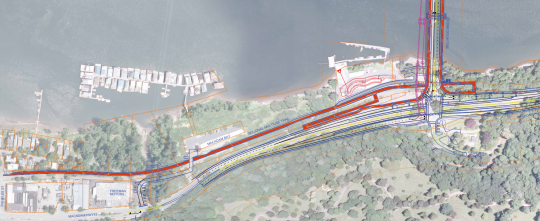
(Map: November 2011 Multnomah County open house, edited by BikePortland)
Noting that the current detour along a narrow Macadam Avenue sidewalk “has some challenges,” Multnomah County says it’ll open its much-improved path along the Willamette River by the time the new Sellwood Bridge is ready next year.
“The conditions there are not great, but it is not our road. Better facilities are coming soon… “
— Mike Pullen, Multnomah County
“We definitely do not want to rely on [the detour] after the new bridge opens, because the new bridge will attract a lot more bicyclists and pedestrians,” county spokesman Mike Pullen wrote in an email Friday.
Pullen noted that once the path is open, it’ll create a vastly improved alternative to biking on the current sidewalk along Macadam, which (as a state highway) is beyond the county’s control. We wrote last week about the many problems with that sidewalk, which for the last year has added quite a bit of bike traffic between the driveway to the Macadam Bay Club floating home community and SW Nevada Street as people are diverted during construction.
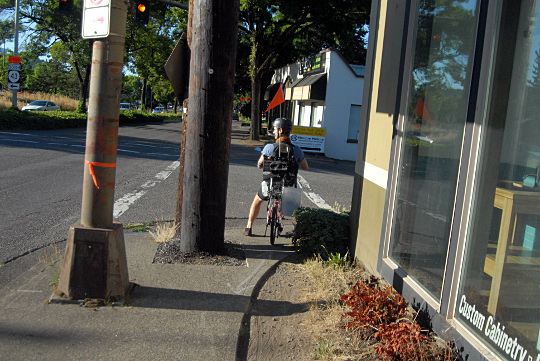
(Photos: M.Andersen/BikePortland)
“The conditions there are not great, but it is not our road,” Pullen wrote. “Better facilities are coming soon in an area that has long needed them.”
Advertisement
The new Sellwood Bridge, which will have two 12-foot-wide shared-use sidewalks and also use green pavement to mark two 6.5-foot on-street bike lanes, is expected to open “probably in late 2015,” Pullen said.
The Bicycle Transportation Alliance and the county’s Bicycle-Pedestrian Advisory Committee have been urging the county to open the new off-road path in time for the new bridge rather than in late 2016, as the county estimated this spring when it decided to save an estimated $70,000 by not building a temporary bridge for biking and walking.
Early this month, the county said there was a chance to open the path along the haul road by the time the new bridge opens rather than continuing to divert people toward the sidewalk. Pullen’s email confirmed this change of plans.
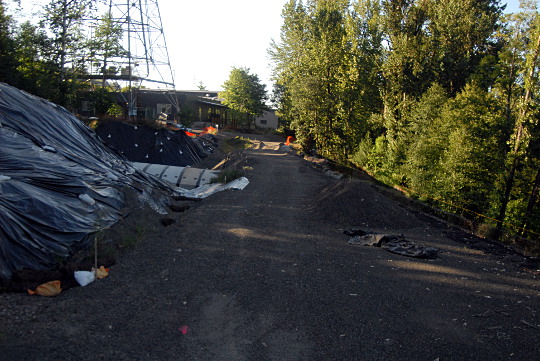
vehicles will become the new shared riverside path.
“We appreciate the patience of everyone who has been using the detour,” Pullen wrote. “We’ve made safety improvements along the detour and we have some more changes coming this summer (mostly signage and striping).”
As for the new path, Pullen wrote, “the trail will be adjacent to a construction haul road, so we will need to have a good traffic plan in place to keep everyone safe.”



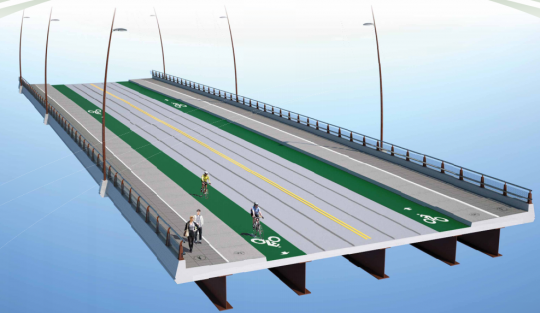

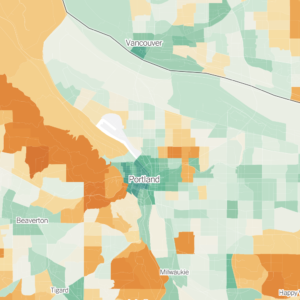

Thanks for reading.
BikePortland has served this community with independent community journalism since 2005. We rely on subscriptions from readers like you to survive. Your financial support is vital in keeping this valuable resource alive and well.
Please subscribe today to strengthen and expand our work.
I’m still in complete shock (two years later) that we are getting FOUR bike lanes on the bridge!!!!!
How do you count four?
Sidewalk MUP with bike markings, each way. Shoulder bike lanes, ea way.
yesterday new commuter came into bike valet looking a little startled. Said she had just biked from sellwood. I told her, “yeah that bridge can be hairy” and she replied that no, it was the detour that had frightened her the most.
Not sure I get the shared lane vs. green painted bike lane. Are people on bikes allowed in the shared lane? Is it designed for slower riders and the green for faster?
I think the goal is the best of both worlds for riders of different comfort levels, as well as just more space. Anyone who has ridden the Hawthorne knows that one shared path isn’t enough, long term.
For example, a family with small kids on bikes could take the shared sidewalk path, while a commuter could zip along on the “on-street” bike lane.
That’s how I’ve always thought of it. upper (separated) section for slower riders/families. Lower “lane” for commuters/faster riders. Really wish the Hawthorne had this kind of option.
Playing around with the new 2035 Comprehensive Plan website (http://www.portlandmaps.com/bps/cpmapp2/) last night, I noticed there’s a plan to extend the greenway trail south of the Sellwood Bridge, as far as the county line. The estimated cost is $500,000, which seems like great value, although the difficult part will be extending to Lake Oswego past. Does anyone know how real this project this is?
PS – there’s a TON of interesting stuff in that website. Would love to see a bikeportland post about it. *cough* Jonathan *cough* Michael.
You read our mind.
*to Lake Oswego past Elk Rock.
awesome another bike friendly bridge.
Why does it look like there are train tracks in the car lanes in the rendering?
The streetcar concept plan has a streetcar line along Tacoma. Nothing other than passive provision (ie making sure the bridge is strong enough) is being built as part of the Sellwood Bridge project. It’s not particularly likely to be built in the next few years.
The Willamette Shore Line runs along this corridor, from Lake Oswego, under the Sellwood Bridge, and north to SW Bancroft St in Portland.
The rail and ties have been removed temporarily to facilitate the haul road, however will be replaced once the project is complete.
It appears the path link will be just east of the rail.
http://bikeportland.org/wp-content/uploads/2014/07/narrow-sidewalk.jpg
What on earth is a wheelchair user to do along this route?
SUE THE CITY/ COUNTY/ STATE FOR VIOLATION OF THE AMERICANS WITH DISABILITIES ACT
Holy smokes! Is the timing a coincidence or was the decision influenced by the recent bikeportland coverage?
I think it was influenced by the bike-ped committee and the BTA, who’ve been watching this issue for months. And I’m sure there were discussions within the project, county and city staff that led to this decision. Pullen made the public commitment the same day our post came out, so it’s not as if the county was on a very different course.
But the biggest win here, I think, would be if people working on future projects started spending more time thinking about which possible bike detours are acceptable. Hopefully our coverage is part of that shift.
Since the roadway isn’t under the county’s authority, do they (or the city) have the authority to issue temporary safety-founded condemnataions to private parking lot owners and establish a meager bike route that links among the parking lots that abut the abysmally-narrow sidewalk? Not saying it’s the best idea, just wondering if it’s (a) possible, (b) reasonable.
If ya’all want to see the interim route fixed immediately, take a tape measure and make a thick line at 32″ with a felt tip pen.
Go out and take a photo of all the pinch points.
Anything less than 32″ is out of compliance for the 1990 ADA Act. As per section 4, “Accessible Routes, Figure 403.5.1 Clear Width of an Accessible Route
http://www.ada.gov/regs2010/2010ADAStandards/2010ADAStandards_prt.pdf p. 118
Send the pics to safe@portlandoregon.gov One email per location, one pic per email, and a street address or landmark where the spot is. They’ll widen everything to 32″ pretty quick.
Spots wider than 32,” but plainly too narrow for safe operation of a bicycle? Send a pic, with the measurements, and say it’s on a heavily traveled bike route, can they look into making some improvements. Results will be variable, but there’s a good chance some of these could be fixed.
Alternately, just email the city and ask for them to review the entire detour route for bicycle operation.
If someone sends in the emails, we’ll see some action. If not, well, it was good enough for the first year, I suspect PBOT figures its good enough for another year or two.
Ted Buehler
For instance, this location:
http://bikeportland.org/wp-content/uploads/2014/07/narrow-sidewalk.jpg
appears to fail the 32″ minimum width standard, and they could easily add pavement back to the hole around the phone pole (wouldn’t help bicyclists, but would help wheelchairs), and pave part of the landscaped area in front of the building (would help bikes and wheelchairs).
This location
http://bikeportland.org/wp-content/uploads/2014/07/autowerks.jpg
is the same. Out of compliance, easily repaired.
This location
http://bikeportland.org/wp-content/uploads/2014/07/facing-north-sidewalk.jpg
appears to have enough space on the inside-side of the utility pole.
Send in pics — either these from BP or your own, and the city, utility pole owner, or property owner will bring them up to code, and you’ll make some wheelchair users very very happy.
Ted Buehler
ADA Act is 24 years old this week, BTW. Thanks to George H.W. Bush and probably decades of prior lobbying by advocates for the disabled, bicyclists have enjoyed decent sidewalks, smooth multiuse paths, and curb cuts for 24 years.
http://www.huffingtonpost.com/joe-entwisle/24th-anniversary-of-the-ada_b_5608845.html
The ADA requirements, as they apply to sidewalks, are only triggered by new construction or alterations. That it doesn’t meet current ADA requirements is irrelevant. If the concern is really for improving life for wheelchair users, then there are much more highly used sidewalks that should be improved first. Or major arterial streets without any sidewalks at all.
And while yes, the detour for bikes is pretty awful, it’s worth remembering that they’re building a bridge and associated trails that will be better for bikes than anything else currently existing in the city. Until then, the construction is a huge pain for everyone – cyclists, drivers and pedestrians.
maccoinnich wrote:
“The ADA requirements… are only triggered by new construction or alterations…”
Really? I guess that makes some sense. I hear stories about disabled folks suing restaurants and whatnot, but maybe those restaurants had been altered and not brought up to compliance.
“Until then, the construction is a huge pain for everyone – cyclists, drivers and pedestrians.”
But, there’s a quantifiable and qualifiable difference here.
The interim car infrastructure meets code. Meets design standards. 10′ minimum lane width. Stop control at intersections. But the bike and ped infrastructure does not meet code, standards, or guidelines. Making distinctly more dangerous than the parallel auto route.
All I’m saying is, if readers don’t like the fact that the marked detour is unrideable by a bike (in terms of not meeting the minimum recommendations in the Oregon Bicycle and Pedestrian Plan, the AASHTO Bicycle Design Guide, and the design guidelines in the Portland Bicycle Master Plan, then they have recourse. Send a complaint to the city and ask that the detour have some simple, fundamental safety improvements be made.
Ted Buehler
I wish someone would take up the cause and sue the city to make them outlaw the ridiculous new design for the crossing button apparatus that puts it on the wrong side of the pole.
http://media.katu.com/images/crosswalk_button_signal.jpg